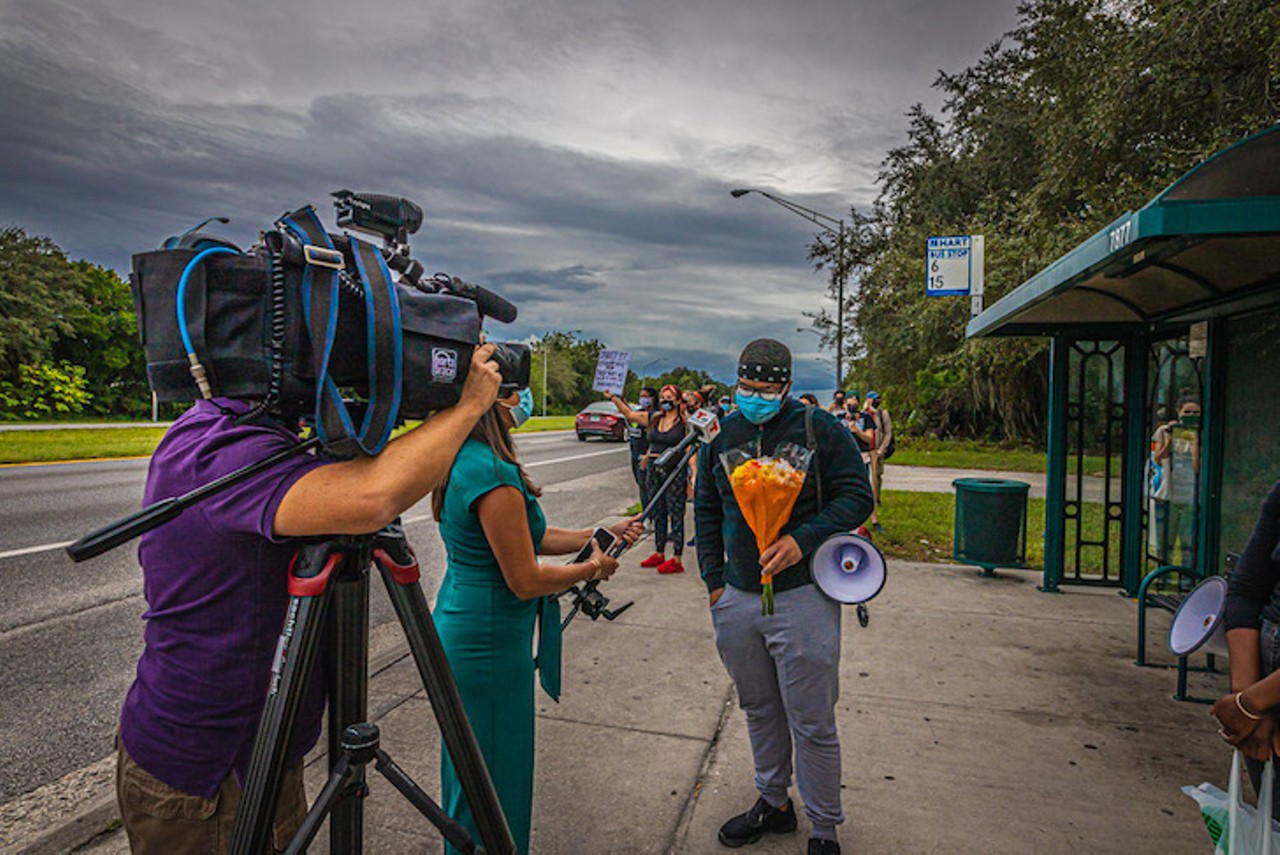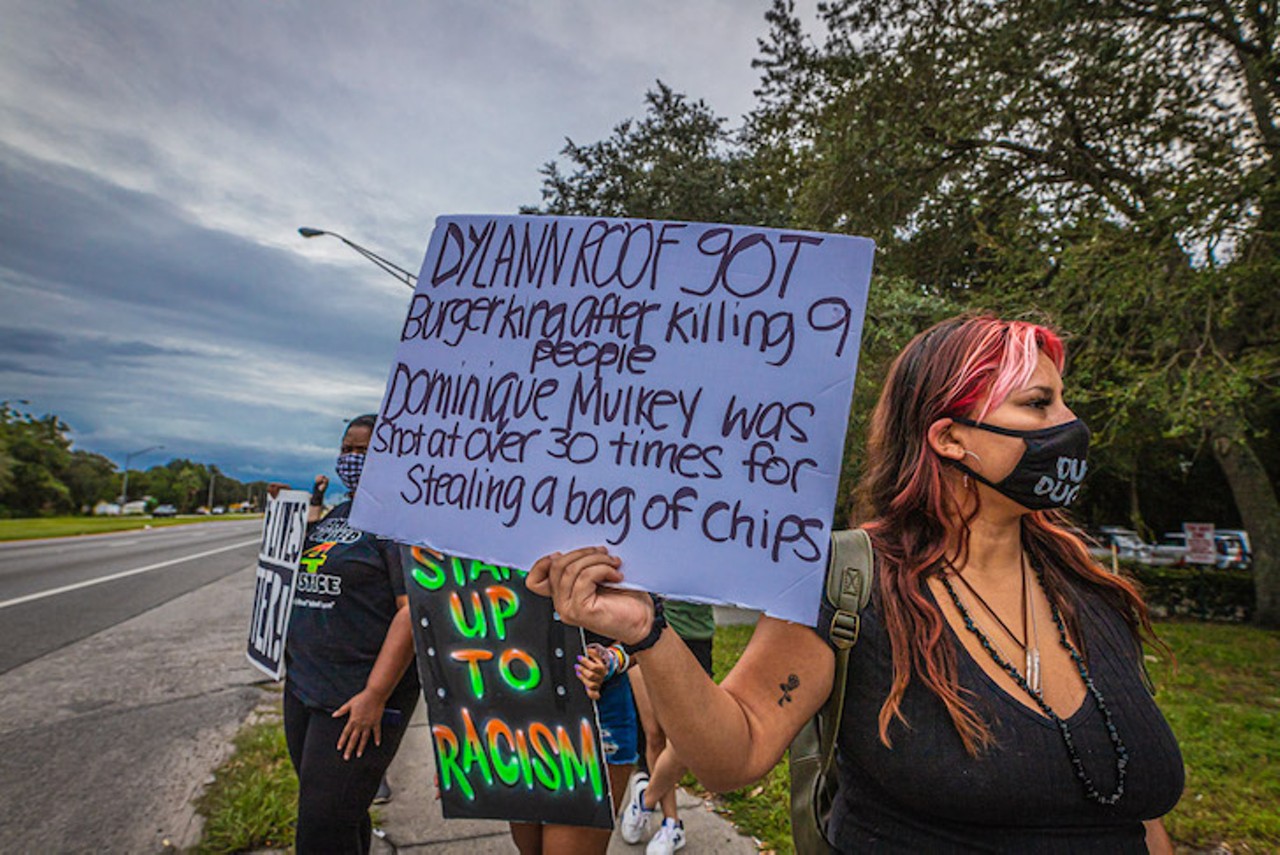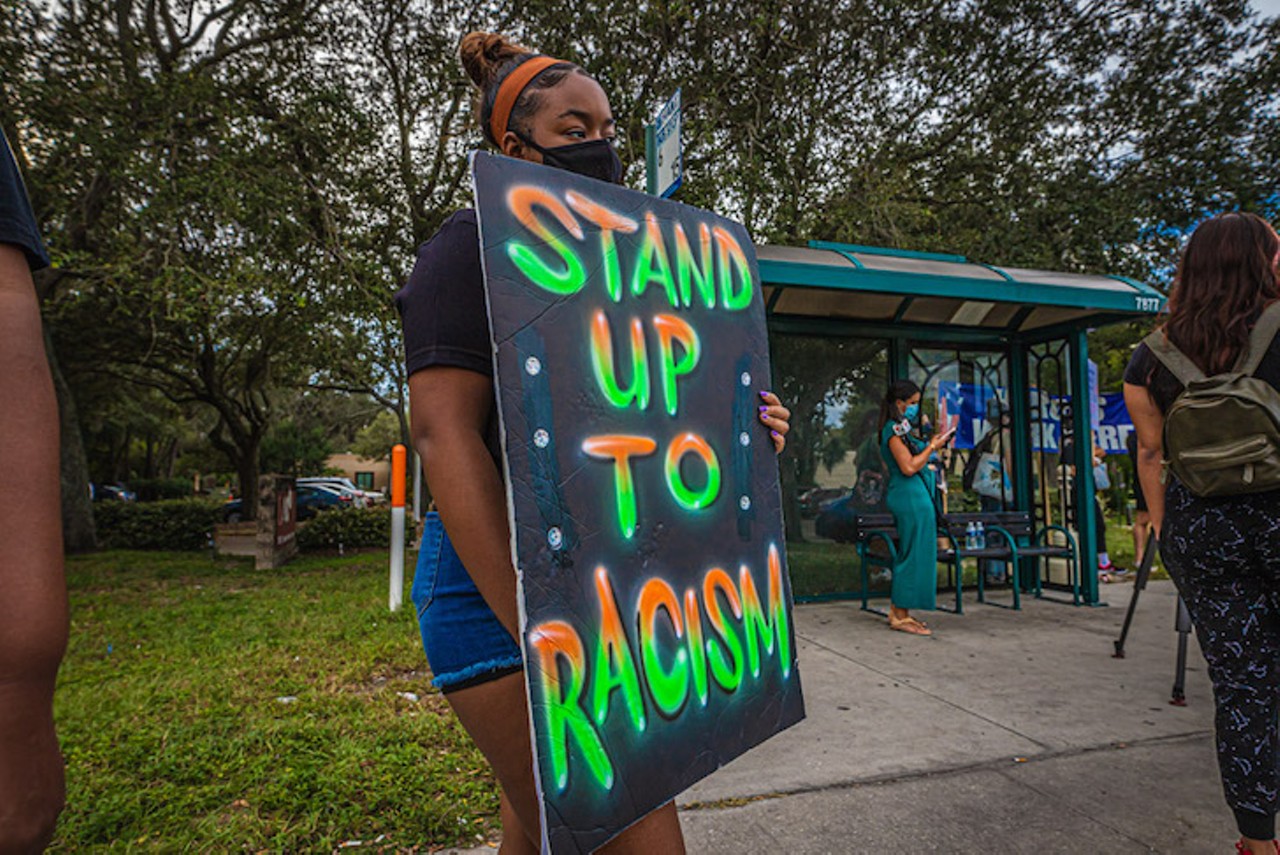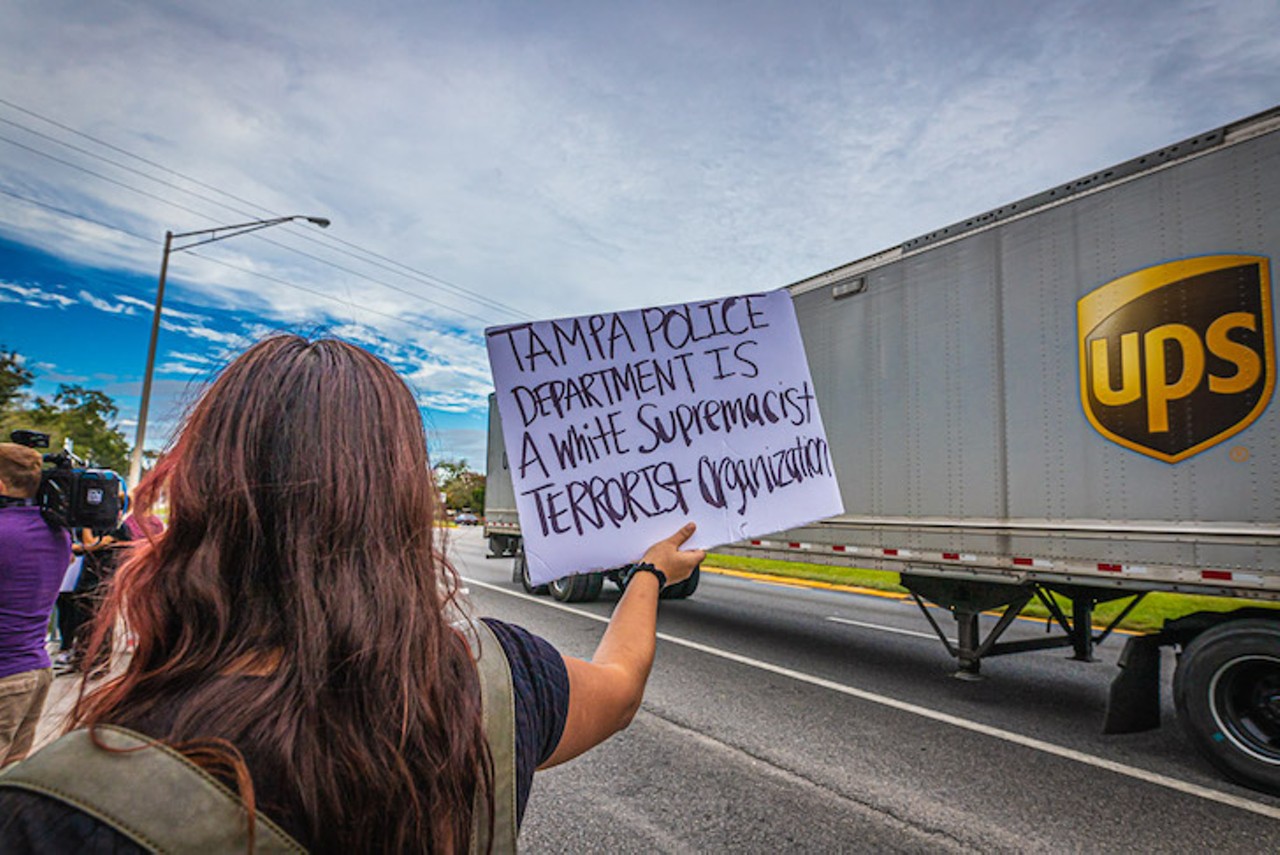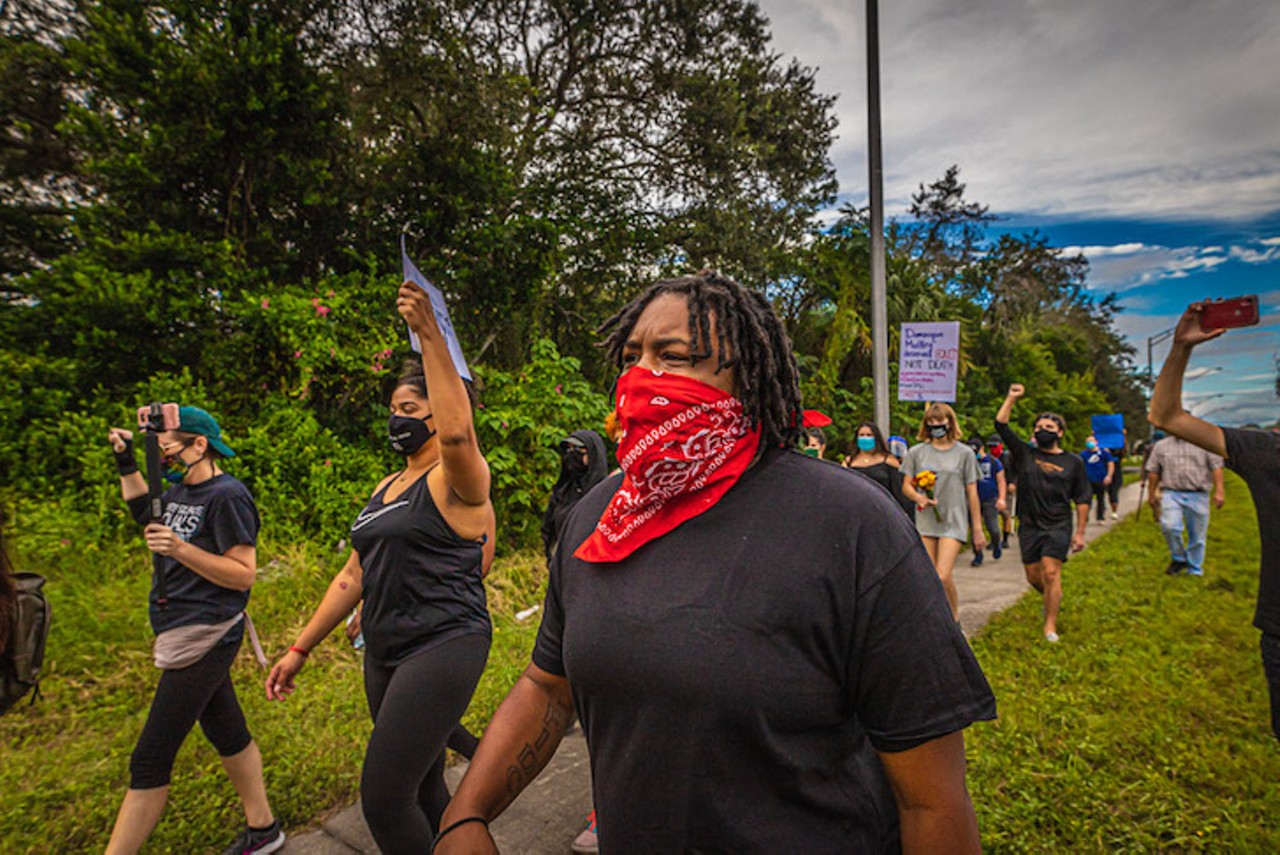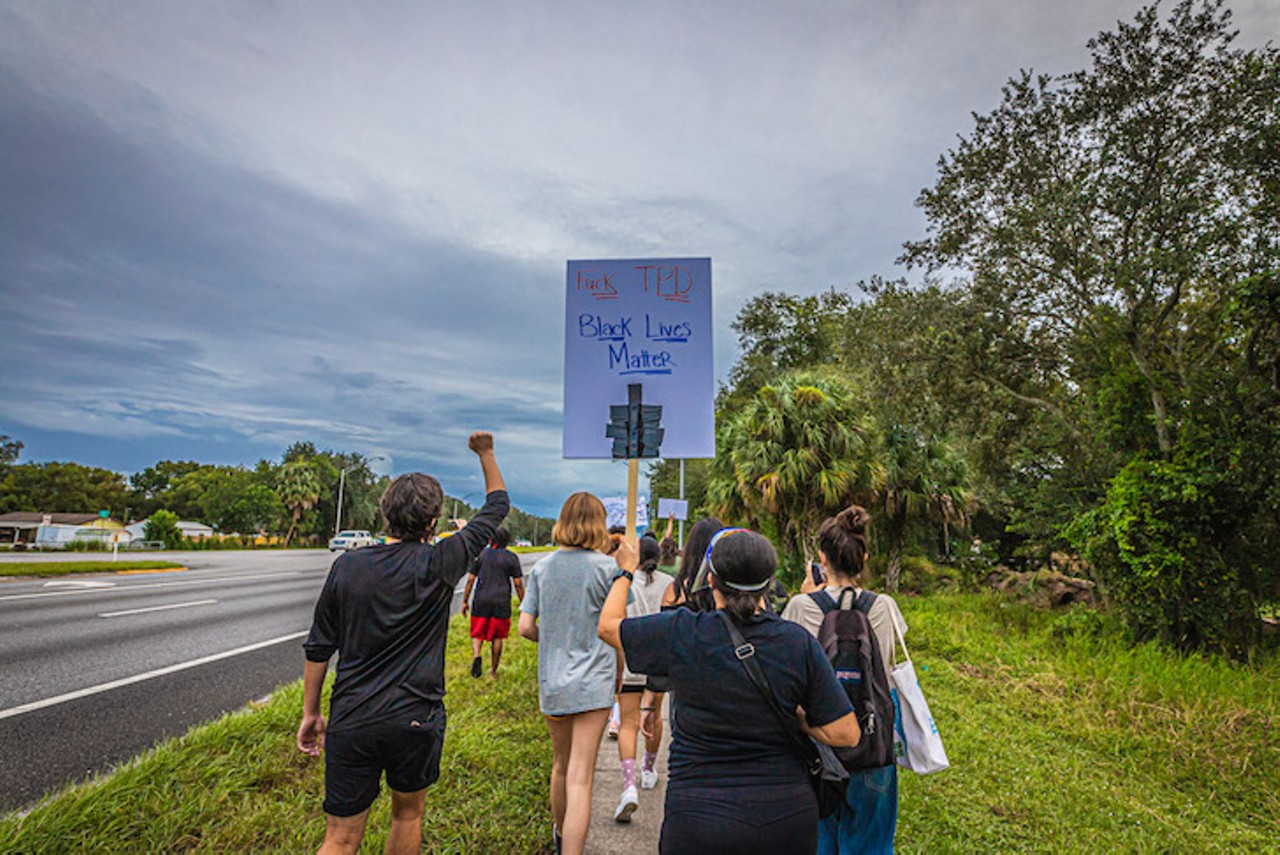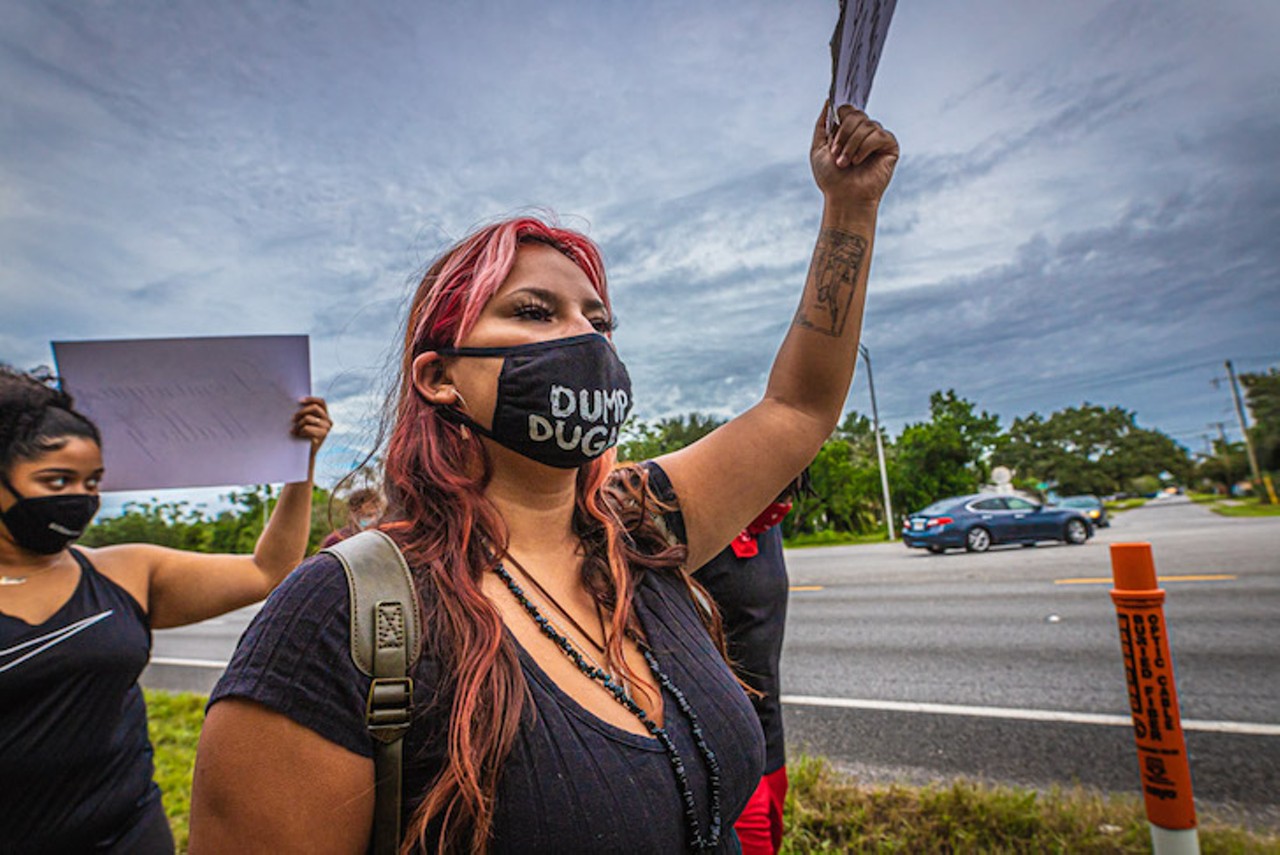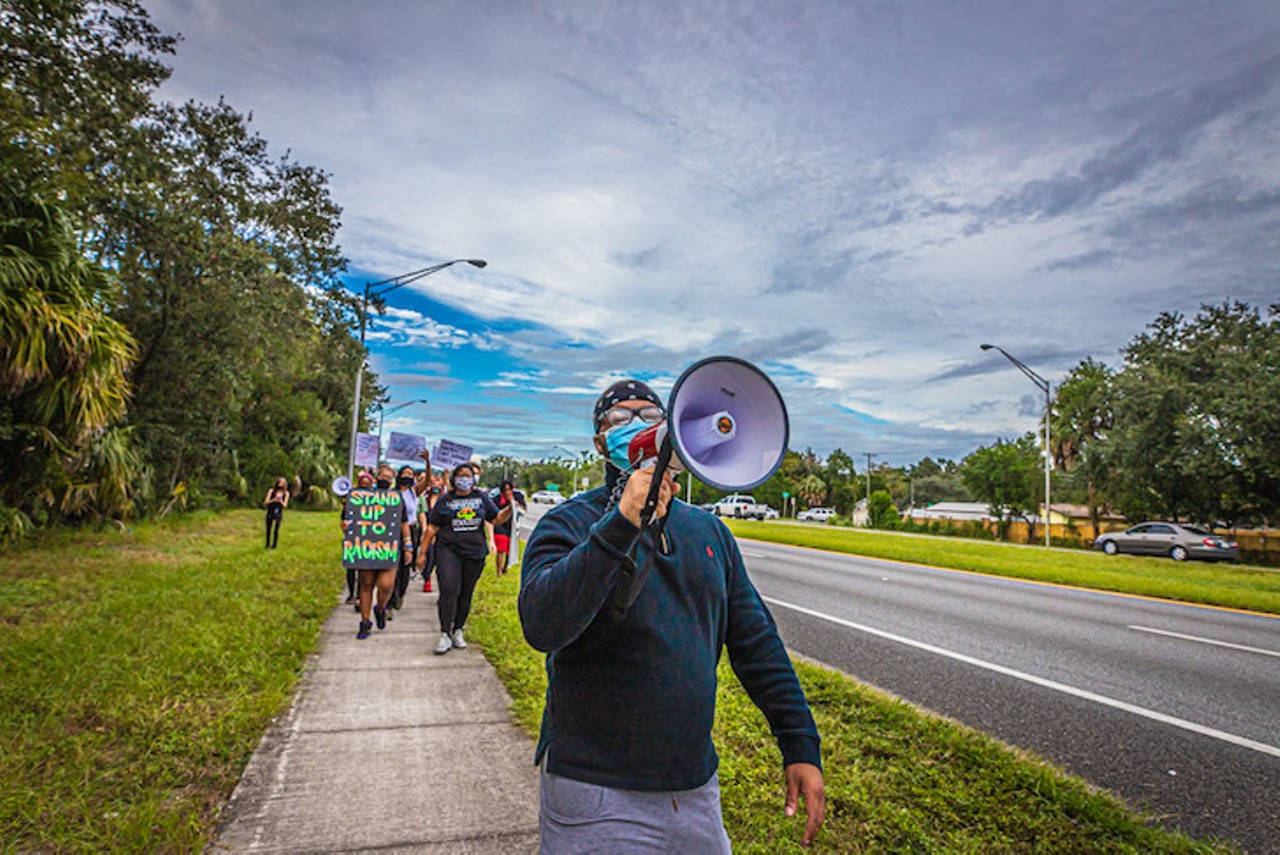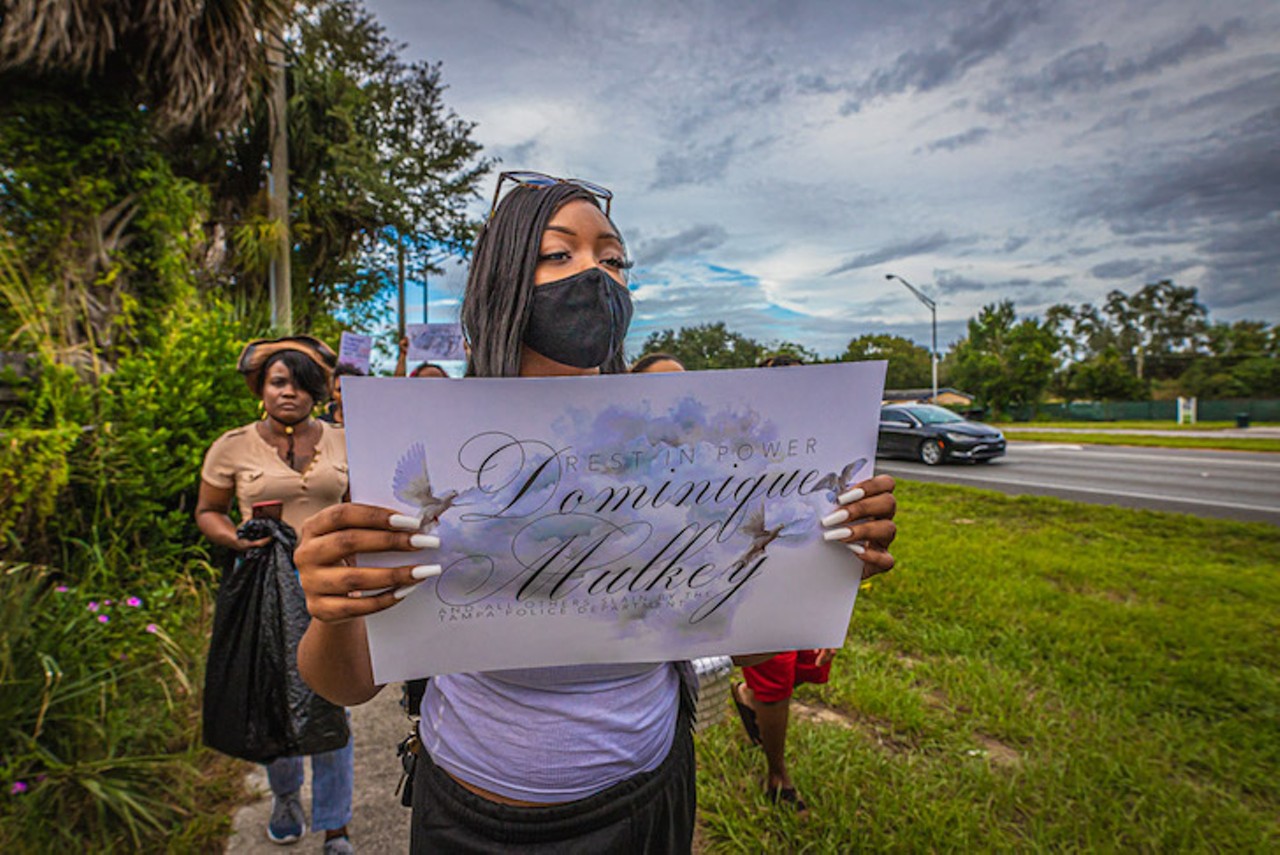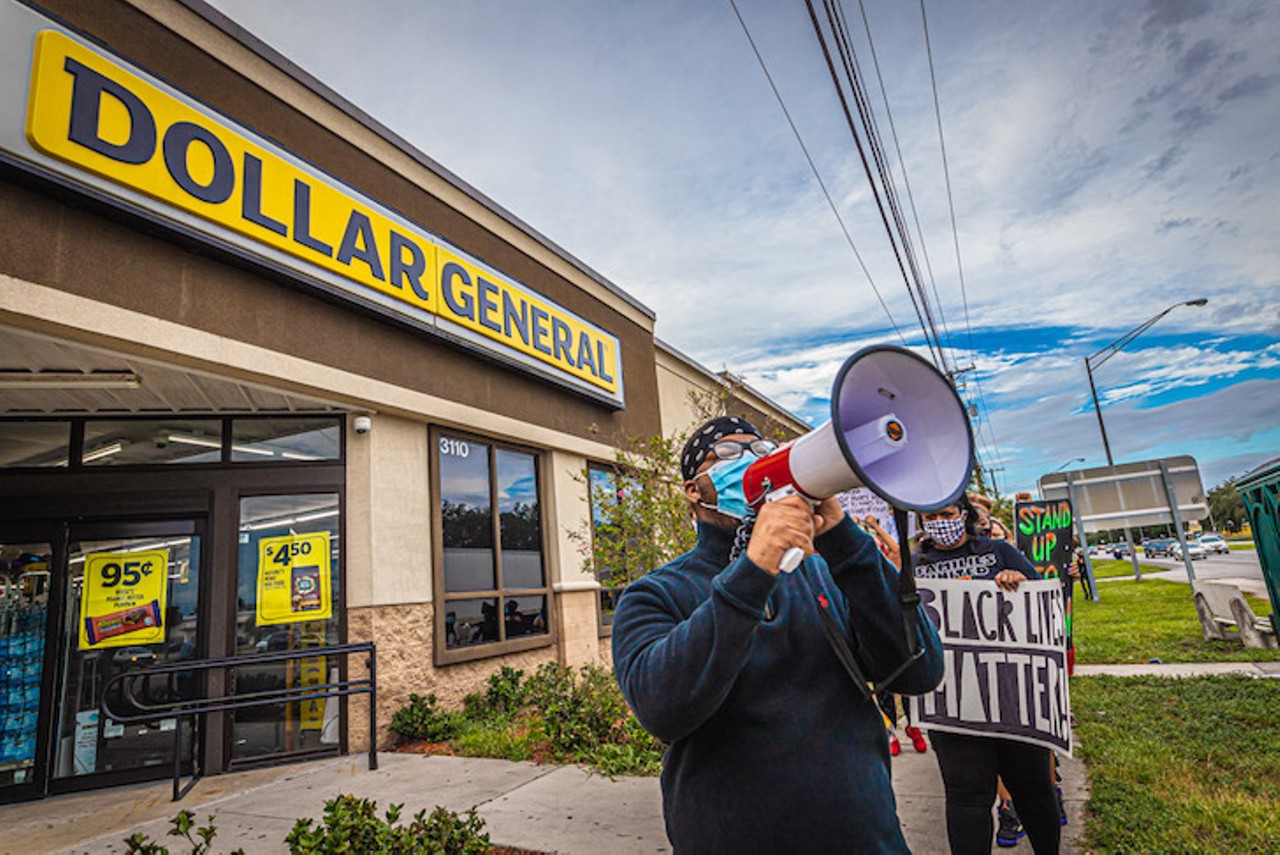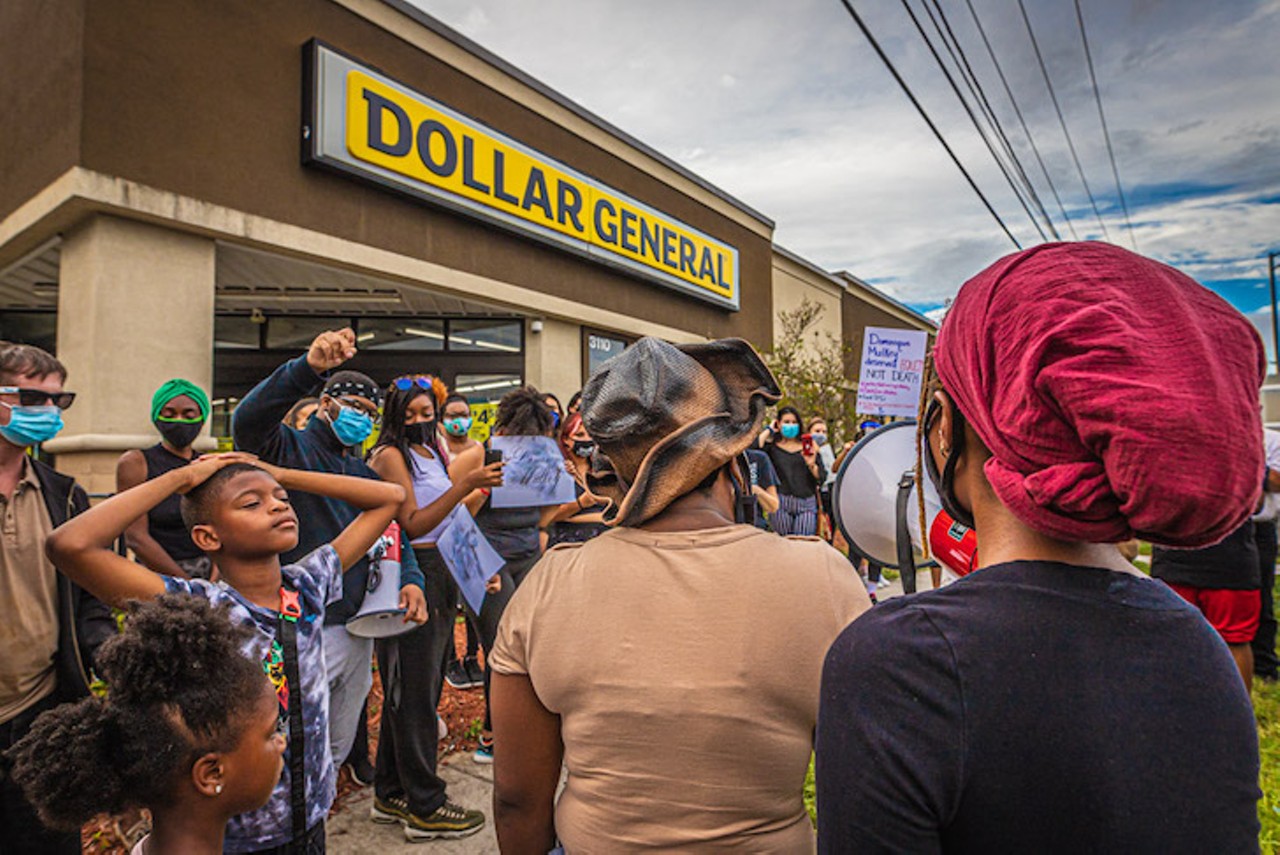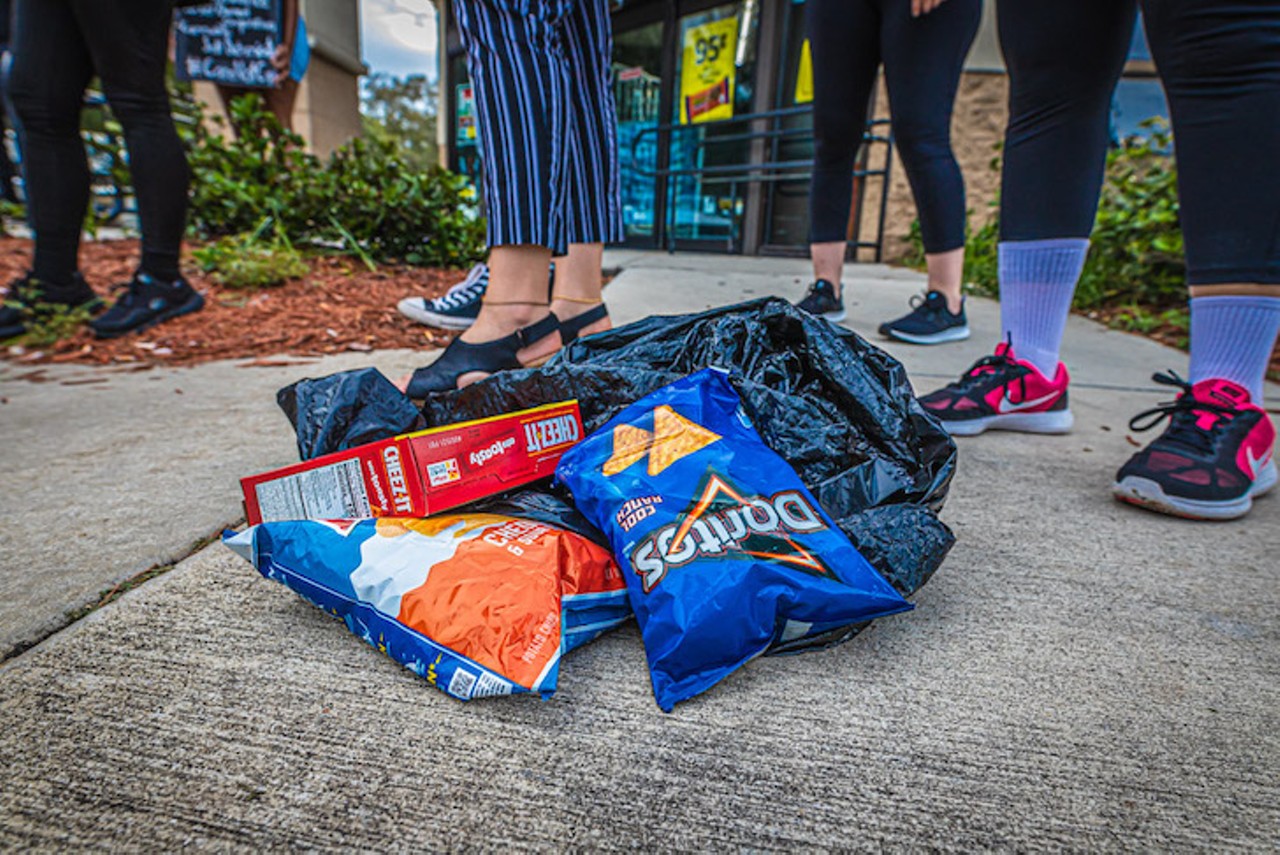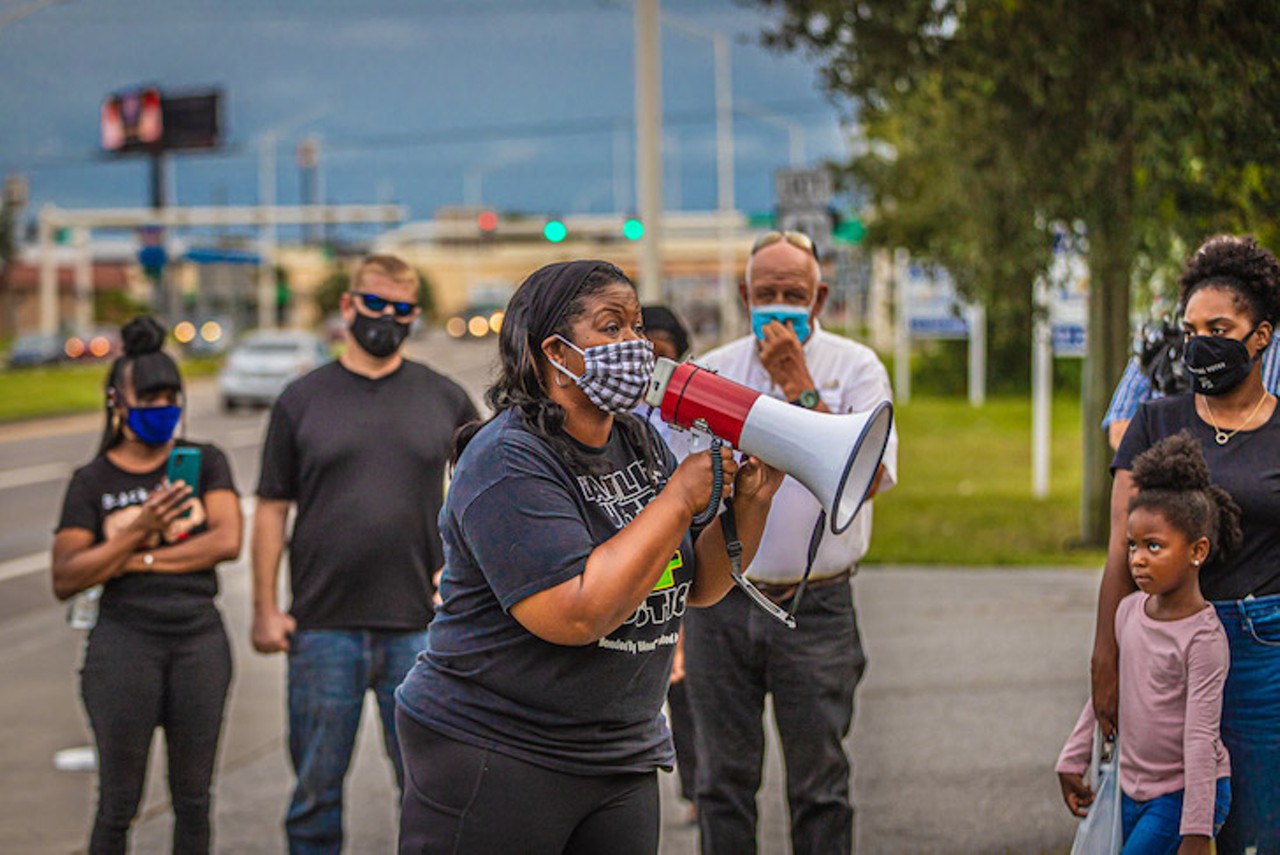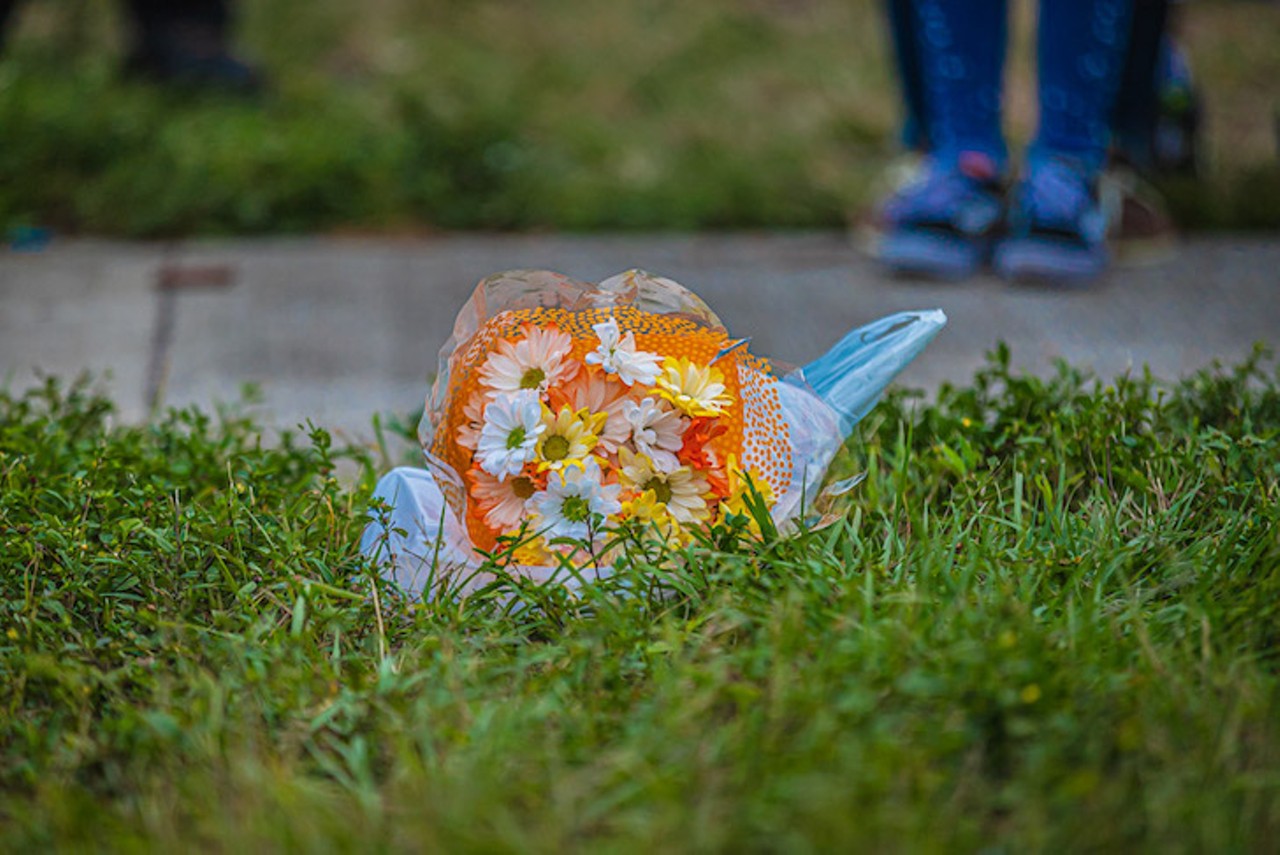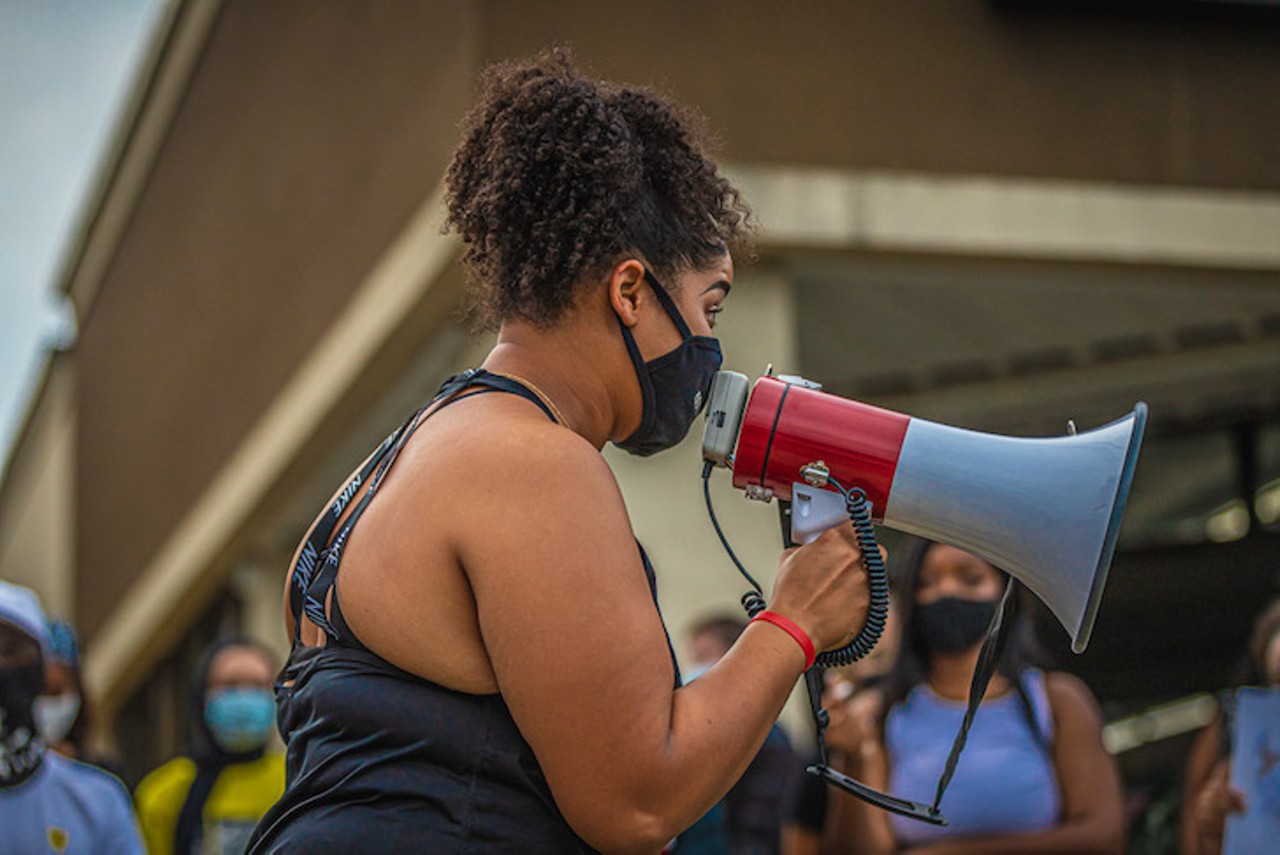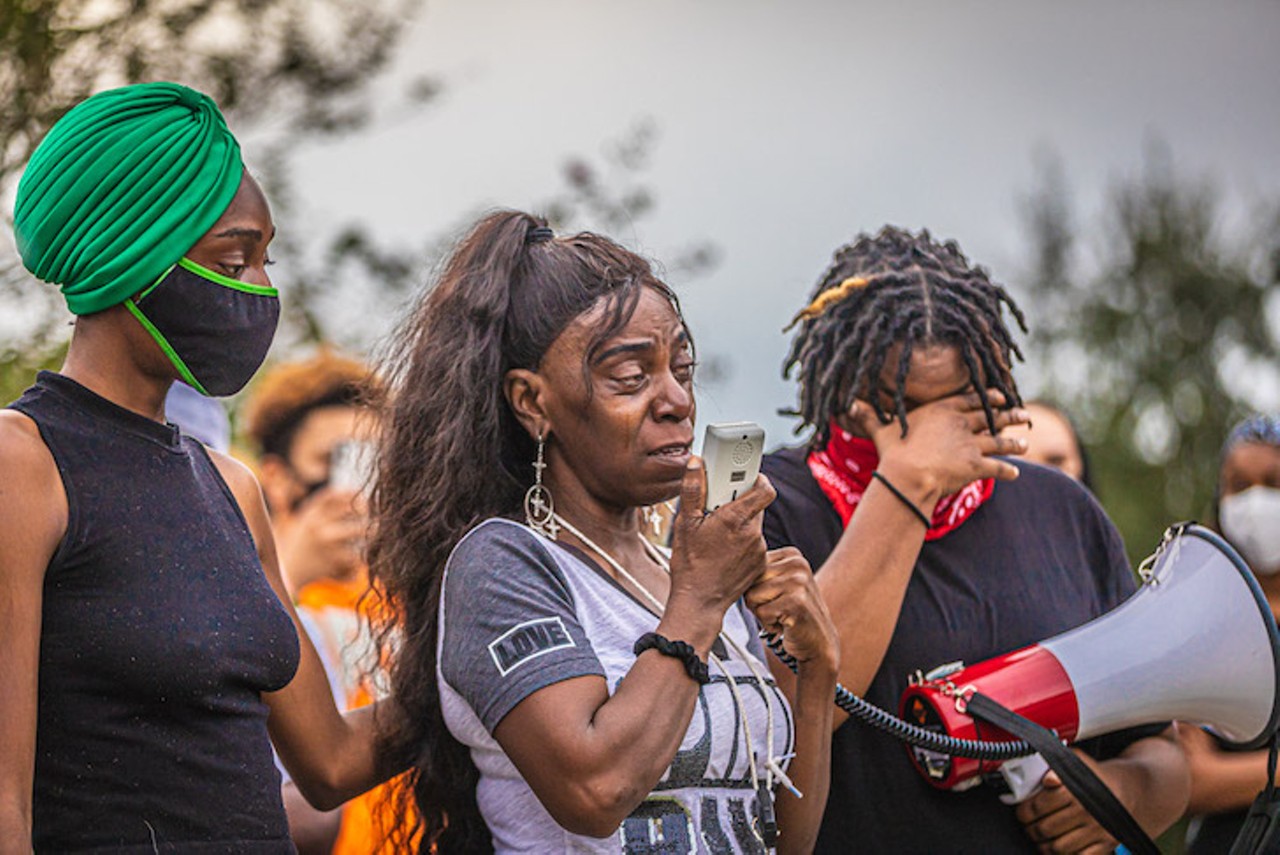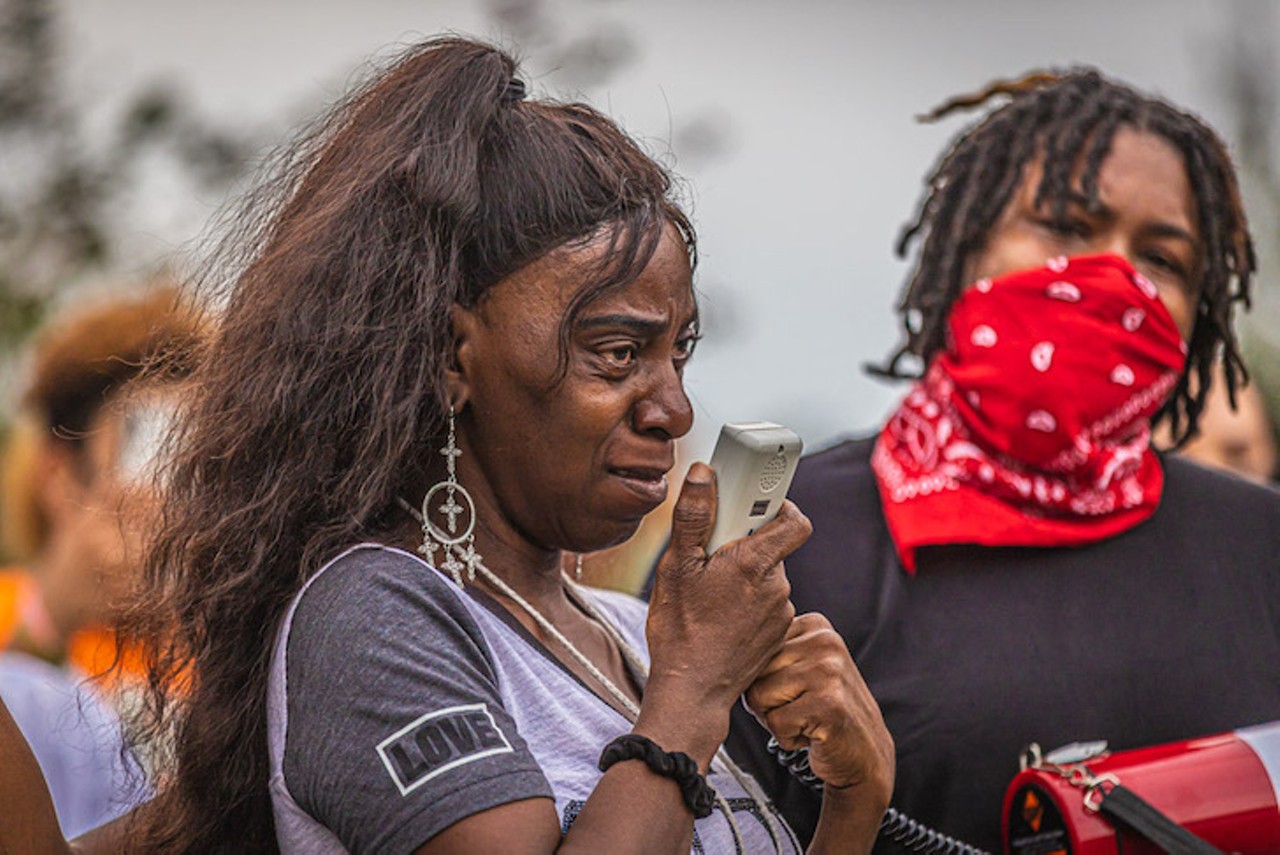Racial justice activists led a march and vigil on 50th Street Friday evening for Dominique Mulkey, a 26-year-old Black man who was fatally shot by two Tampa police officers Tuesday morning, Oct. 20, after robbing a nearby Dollar General store while armed.
Community allies and members of the local Black Collective Movement (BCM), who have led several Black Lives Matter protests in the wake of George Floyd’s death this past May, joined Mulkey’s family in marching to the Dollar General store—located at 3110 N. 50th St. in the Highland Pines neighborhood—and holding a vigil at the site where Mulkey was fatally shot.
“All Black lives matter,” said K.D., an organizer with BCM Tampa. “A Black person that is a criminal matters… a Black person does not have to be perfect to not die at the hands of a police officer.”
Several of Mulkey’s family members—including several of his siblings, a brother-in-law, his foster mother, and stepfather—attended and spoke of their late loved one. “He died trying to get food,” said Mulkey’s mother, referring to the black trash bag of dollar store merchandise Mulkey had stolen shortly before his death, which included a box of Cheez-Its and a bag of Ruffles potato chips.
Early that morning, at a press conference outside TPD’s third precinct, his mother explained that Mulkey had been in foster care, and that if she knew he was hungry there, she would have taken him out of the home immediately. With tears running down her cheeks on Friday night at the vigil, her voice broke. “I can’t blame nobody but myself,” Mulkey’s mother told the crowd, her face drawn.
Immediately the crowd responded. “No” Several people spoke. “Your baby was not a criminal,” one of the crowd members told her. “I don’t give a damn what anyone says. You are not to blame for them [Tampa police] taking his life.”
Mulkey’s stepfather, Robert Smith, spoke at the site where his stepson was shot, five blocks from the Dollar General. Motioning towards the fence, Smith pointed towards the bullet holes, and towards the homes behind them, which laid the backdrop of where the fatal shooting occurred. “Kids could have been out here. Anybody could have been out here.”
Earlier that day, during the morning press conference with Mulkey’s family and local civil rights activist Michelle Williams also noted the sloppiness of the opened fire unleashed upon Dominique Mulkey and the homes behind him.
Not only did Tampa police fire over 30 shots at Mulkey, who died that same day of his injuries—but they also wreaked property damage, an expense and trauma that pales in comparison to the loss of a man’s life, but nonetheless further burdens the community Mulkey leaves behind.
“Our bodies are not expendable,” K.D. told the crowd of community allies. “Black bodies are not expendable.” The crowd lit candles at the site of the shooting. Several marchers led prayers. “Please use this time to cherish one another.”
As the evening wind blew out the lit candles, and the sky darkened, Mulkey’s family thanked the community for coming out to hear them speak of their late loved one, and to light candles in honor of his life. “You never think this will happen to you,” spoke one of Mulkey’s sisters.
On Oct. 20, minutes before he was shot to death, Mulkey had been identified as an armed suspect from a Dollar General robbery. The officers, one of whom was wearing an activated body camera, encountered Mulkey five blocks away from the store, on 50th Street.
“The Tampa Police Department murdered a man today,” one Tampa activist shared Tuesday on social media following initial reporting. “They murdered this black man with mental health issues over a bag of chips.”
Video footage from the Tampa Dollar General, acquired and shared by the Tampa Police Department, shows Mulkey stuffing a black trash bag with store merchandise, later identified as various snack items. When store clerks took the bag away from Mulkey, he pulled out a handgun. The store clerks called 911, and Mulkey fled the store with the bag on foot.
Minutes later, the two police officers—whose names have not been released to the public, with Tampa Police Chief Brian Dugan citing Marsy’s Law—encountered Mulkey. Audio from one of the officers’ body camera footage reveals the officers calling for Mulkey to drop his gun, lower his hands, and get on the ground multiple times. Mulkey did not lower his gun, but turned towards the officers with the gun still in hand.
During Friday morning’s press conference, Mulkey’s family told local reporters that Mulkey was hard of hearing, and may not have heard the officers shouting at him. His family also confirmed that Mulkey had a history of mental health issues, which the police officers were not aware of when responding to the initial 911 call. “He doesn’t have the cognitive thought to say, well okay, I’m gonna run with the gun in my hand. He doesn’t have that,” Mulkey’s stepfather, Robert Smith, told WFLA earlier this week.
Body cam video from the incident shows the officers opening fire, with at least one of the officers’ rounds striking Mulkey. Chief Dugan, who spoke to the press shortly after the shooting, reported that Mulkey was then transported to Tampa General Hospital, where he later died from his injuries.
According to Dugan—who’s been criticized in recent months for statements he’s made regarding Black Lives Matter protestors—one of the officers who shot Mulkey is a 25-year veteran of the police department, and the other a 24-year old with two years of experience on the force. As reported by the Tampa Bay Times, the officers involved have invoked Marsy’s Law—a victims protection amendment to the Florida constitution—to prevent their names from being released to the public, on the basis that Mulkey had pointed his gun at the officers prior to their opening fire, thus legally qualifying them victimhood.
Police argue that video from one of the officers’ bodycams shows Mulkey “pointed/raised his gun at" the officers. TPD spokesperson Jamel Laneè told the Times that when that happened, “[officers] became victims of aggravated assault with a firearm.”
Williams, however, disputes this claim, and asserts that the acquired footage from both the body-worn camera and Dollar General showed that Mulkey had not pointed his gun at the police officers, nor the store clerks. Nor was Mulkey violent, despite the evident threat posed by the firearm.
“The officers are physically okay. I can tell you emotionally, they’re upset,” Dugan first told reporters on Tuesday, in the aftermath of the shooting.
“We had two officers who went through a very traumatic event,” he told press later that afternoon. “We have someone who has died. We had innocent store clerks and customers there. And now we have families that have to put the pieces back together.”
Tuesday’s dollar store robbery was not Mulkey’s first encounter with the law. According to court records acquired by WFLA, Mulkey had two previous misdemeanor charges for petty theft and trespass for an attempted robbery of a nearby dollar store.
As voiced by his family, Mulkey had unresolved mental health issues and was unable to access care for his disability. The Florida Agency for Persons with Disabilities confirmed to WFLA that the agency had not had contact with Mulkey following his prior encounters with the law.
The fatal shooting of Dominique Mulkey by Tampa police has caught the attention not only of locals, but also national news outlets and police reform activists across the country. They/Them Collective, an activist group based in Washington D.C., shared that they would be holding a protest on Saturday in honor of Dominique Mulkey.
Mulkey’s family, and activists who organized the vigil Friday evening, confirmed the family would be trying to get a GoFundMe up in the next week or two to cover funeral expenses and related costs.
In a statement released on the afternoon Mulkey was shot, Tampa Mayor Jane Castor said, “This is a difficult day for all involved.”
“My thoughts are with the family who lost a loved one under tragic circumstances, with the officers who were put into a position that required them to use deadly force, and the innocent store employees who were traumatized by this incident. The officers took actions today to protect our community. Now, FDLE will conduct an independent investigation as part of a new process that ensures objectivity and transparency.”
Williams said the family has not heard from FDLE regarding a timeline on the investigation, nor has she heard from any Tampa City Councilmen (the council may be unable to comment until the investigation is complete).
Tampa City Council is still considering proposed changes that would give Tampa’s currently toothless Citizen Review Board (CRB) power to issue and enforce subpoenas so that it can obtain the documents, testimony, and surveillance footage that enable it to perform meaningful investigations and seek out information overlooked by law-enforcement internal investigations.
“Despite rumors to the contrary, City Council’s authority to do so by ordinance is well-established under Florida law,” Tampa For Justice, an activist group that has outlined 12 specific changes it would like to see for the CRB, wrote in a September press release.
The CRB currently only has power to do its investigation after officials conclude theirs. If council gives activists the changes they want, the CRB—ideally working with its own attorney as to not impede on FDLE and possible State Attorney investigations—could conduct its own investigation, at the same time as FDLE or Professional Standards Bureau using evidence it obtained independently.
But even then, the CRB’s conclusion could only act as an additional opinion to other investigations. Still, knowing an independent body like the CRB was doing its own investigation could implore the FDLE or Professional Standards Bureau to do a more thorough job.
The Tampa Bay Times reported that last month, “City Attorney Gina Grimes pledged to work with the ACLU and police union officials to find a workable solution to an overhaul of the volunteer Citizen Review Board by Thanksgiving.”
“Council members then voted unanimously to have Grimes bring back a draft ordinance at the council’s Nov. 19 meeting,” the Times added.—McKenna Schueler
UPDATED: 10/27/20 3:33 p.m. Updated Michelle Williams' title and background on Tampa activists' push to give more power to the city's Citizen Review Board.

